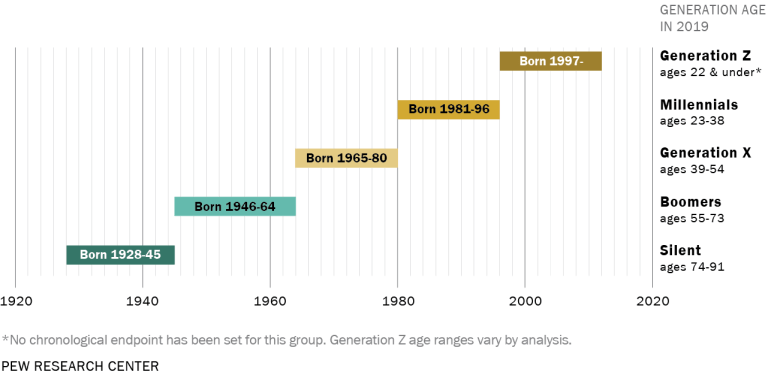OK BOOMER!
The term “OK BOOMER!” (capital letters intentionally and ironically used) has been omnipresent lately. I first took notice of it last month when a member of the New Zealand parliament used it against an arguably older fellow member who was heckling her during a speech about the climate crisis. The recipient of her retort may not have understood its meaning, but those of her generation certainly did. Similar to “talk to the hand,” this expression dismisses the other party and ends the conversation, yet it’s more biting than that. “OK BOOMER!” implies that the recipient can’t even understand where the other party is coming from – as if there’s no common background or even language, hence there’s no need to continue.
According to the Pew Research Center, I’m a card-carrying member of Generation X (for your convenience, find your age-appropriate generation name below):
I’m no Boomer, but I’m not far away. Since I spend my time in the healthcare IT world, this generational discord got me contemplating if and how physician use of tech is affected by age. The predictable response to this question is that of course, older physicians are resistant to change and to technology, and they just want to go back to pen and paper like we had in the good old days. While this is the easy and obvious answer, I’m not convinced it’s the most accurate.
I did find some research on this issue. While some investigations did find a negative correlation between physician age and technology adoption, other studies found no such correlation. One article noted that “contrary to conventional wisdom, on bivariate testing, we found that older, clinically busier staff physicians who saw patients with more documented problems, were more likely to use novel EHR [electronic health record] functionality and use it more heavily.” Curiously, I found a report discussing computerized physician order entry (CPOE) at my own institution, but long before I arrived! “We observed numerous older physicians who were resistant to POE [sic] at one time but who happily use it now.” Once it becomes obvious that the EHR isn’t going away, young and old alike use it as best they know how.
While the studies may have contradictory findings, my experience is that doctors of all ages will adopt technology that works for them. It’s just that simple. If a particular tool will help a doctor take care of a patient better or faster, that doctor will use the tool! This is not to say that as EHRs were being implemented for the first time, physicians of all ages jumped for joy. I was there; jumping for joy wasn’t something that I typically saw. Yet, as the software was incorporated into the daily workflow and ultimately became the only way to document and order, clinicians used the tools, no matter how clunky they may have been (or may still be).
I’ve observed one situation where older physicians are actually more adept at taking care of patients in our high-tech world than their younger counterparts: downtime. As with all technology, sometimes it just doesn’t work and you must revert to backup plans. For younger doctors who have “grown up” with the always-on EHR, it can be quite disorienting to imagine a world of . . . paper. What do you mean I can’t see the lab results from last week, or last year? You want me to make a decision without reading the discharge summary from the other hospital? For those of us who practiced in a paper world, these questions seem silly, yet for doctors who know no other way, it can be genuinely scary to take care of patients with limited data.
There are areas where older clinicians most certainly differ from their younger counterparts: vision and dexterity. I felt this acutely when I recently went to the optometrist and he insisted that I move from single-vision lenses to progressives (we do NOT use the term bifocal, people!) While I consider myself young and sprightly, maybe . . . sometimes . . . on occasion, the text on the screen is a bit small and difficult to read. Also, it may be difficult for some of us to click on that tiny target on the screen with the mouse. EHR vendors and other software developers need to remember that not all of their users are in their twenties; code accordingly!
Allow me to summarize:
- Younger docs and those not as young will all adopt tech that works. (Lesson: make it work!)
- Older more experienced docs can deal with the adversity of no tech with a bit more aplomb than some of our younger colleagues.
- As we age, we are sometimes faced with vision and dexterity changes. (Lesson: don’t make us squint at tiny text and click on tiny targets!)
- Don’t “OK BOOMER!” me. Just don’t do it.
Feel free to @ me with comments!


